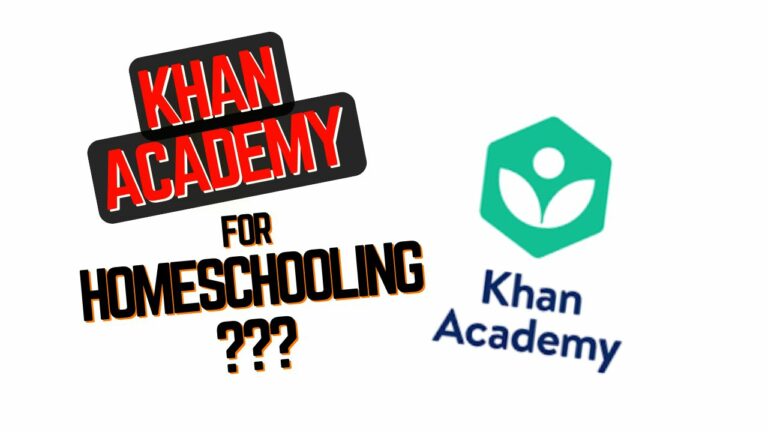Khan Academy is a big deal in online learning, with lots of free videos and courses. As homeschooling gains popularity, the question of whether Khan Academy can serve as a primary resource for a complete curriculum arises. In this exploration, we will take a look at the advantages and disadvantages of using Khan Academy as a complete homeschool curriculum. This will help you make an informed decision on whether this program is for you or not.

I hope you enjoy reading this blog post. If you want to do my course on how to homeschool, click here.
Let’s start with the pros and cons – why Khan Academy is good for homeschooling, but some reasons it also might not be for your family.
Reasons Khan Academy is Good for Homeschooling
So here are some reasons Khan Academy might be a good fit for your kids and family.
Free and Accessible
One of the most appealing aspects of Khan Academy is its cost—it’s a completely free homeschool curriculum program.
This financial accessibility makes it an attractive option for homeschoolers seeking quality affordable education without incurring additional expenses.
Diverse Courses and Videos
Khan Academy provides a wide array of videos and courses covering various subjects, ranging from mathematics to humanities.
This versatility allows homeschooling families to tailor their curriculum to suit the diverse needs and interests of their children.
Interest-Based Learning
For those leaning towards an unschooling approach, Khan Academy offers a valuable resource. Its content allows for interest-driven learning, empowering students to pursue subjects they are passionate about.
Connecting with Other Learning Plans
A cool thing about Khan Academy is that it can work well with other homeschooling programs.
For example, platforms like Easy Peasy All-in-One include links to Khan Academy videos.
This means you can easily mix and match resources for a fuller learning adventure.
Reasons Khan Academy Isn’t Good for Homeschooling
Lack of Accreditation and Support
It’s essential to note that Khan Academy was not designed to be an accredited homeschool curriculum.
Families seeking a program that tracks progress, grades assignments, and issues diplomas may find Khan Academy lacking in these areas.
Additionally, the absence of direct support through phone calls could be challenging for those in need of immediate assistance.
Incomplete Coverage
While Khan Academy excels in high school mathematics, it may fall short in providing sufficient material for elementary and middle school science or English classes.
This limitation can make it less suitable for the younger years of homeschooling.
Secular Worldview
Khan Academy is secular.
This means if you want a Christian homeschool curriculum, you’re going to hear white noise.
Many Christians still use this curriculum as a supplement to their normal curriculum, which might be missing information in a particular area.
Of course, it’s great if you want a secular homeschool curriculum though.
Limited Support Channels
Direct support from Khan Academy is limited, leading homeschoolers to seek assistance from online communities, such as Facebook groups.
While these groups can address general queries, they may not offer the personalized help some families require.
Alignment with Common Core Standards
The math content on Khan Academy aligns with Common Core Standards, which may not align with the preferences of families following alternative educational frameworks.
How to Use Khan Academy for Homeschool
If you’re up for the pros and don’t mind the cons, Khan Academy is a great resource for homeschooling, and here’s a simple guide on how to use it effectively:
1. Know Your Goals
Start by figuring out what you want to achieve in your homeschool.
Decide the:
- subjects,
- grade levels, and
- whether you’re following a specific plan or going with what interests your child.
Sit down with your partner to get this part done too so you can align your goals (nothing worse than disagreeing on curriculum choices when you’re half-way through your homeschool year!).
2. Customize Learning
Use Khan Academy’s options to fit your style – either your children’s learning style, your temperament, or a homeschool method(s) you’re in love with. (If you’re not sure what homeschool method you like, do the homeschool methods quiz).
Then, pick subjects and courses that match your goals, and feel free to mix in other materials like books and activities. (Here’s a complete homeschool booklist for all grades. You can find most titles as read-alouds for free on Youtube).
3. Set a Schedule
Create a regular, flexible, simple homeschool schedule for using Khan Academy. You can either do that yourself, or you can use Khan Academy tools to do this.
Whether it’s every day or a few times a week, having a routine helps.
Break down learning into short sessions using the platform’s videos and exercises.
4. Keep an Eye on Progress
Check the progress dashboard on Khan Academy to see what your child has completed.
This helps you understand where they’re doing well and where they might need more help.
5. Learn at Your Own Pace
Encourage your child to go at their own speed. Khan Academy allows them to explore subjects they find interesting, making learning more enjoyable.
6. Get Support Online
If you have questions, turn to online homeschooling communities like Facebook groups.
They can offer advice and answers since Khan Academy doesn’t have direct support.
7. Mix in Real-World Stuff
Make learning more fun by connecting it to the real world. Take homeschool field trips, do experiments, or work on projects related to what they’re learning on Khan Academy.
8. Be Flexible
Homeschooling is flexible, so go with the flow.
Adjust your plan as your child’s needs and interests change. Khan Academy can adapt to different learning styles.
9. Check-In Regularly
Keep an eye on how things are going. See if your child is engaged and learning.
If something isn’t working, don’t hesitate to tweak your approach.
10. Have Fun Learning
Most importantly, make learning enjoyable!
Use Khan Academy as a tool to help your child discover the joy of learning.
Keep things interesting, and remember that every child learns differently, so find what works best for your family.
Also, check out some of these wonderful fun homeschool curriculum programs here.
Is Khan Academy Accredited for HOmeschooling?
In case you missed it, Khan Academy isn’t accredited.
If you want one of those, see this page on the BEST Accredited homeschool curriculum programs.
Where Can I Learn More About Using this for Homeschool Curriculum?
Read my Khan Academy review here to learn more about this program for homeschooling.
The Bottom Line on Khan Academy for Homeschooling
In the realm of free homeschool curriculum options, Khan Academy presents itself as an accessible and diverse resource. However, its suitability hinges on individual homeschooling philosophies and specific needs. If your priority is a structured, accredited program with robust support, alternative options might be more suitable. For families seeking a flexible, interest-driven learning experience, particularly in high school, Khan Academy can be a valuable addition to the homeschooling toolkit. As with any educational resource, it’s crucial to weigh the pros and cons to determine the best fit for your family’s unique educational journey.



